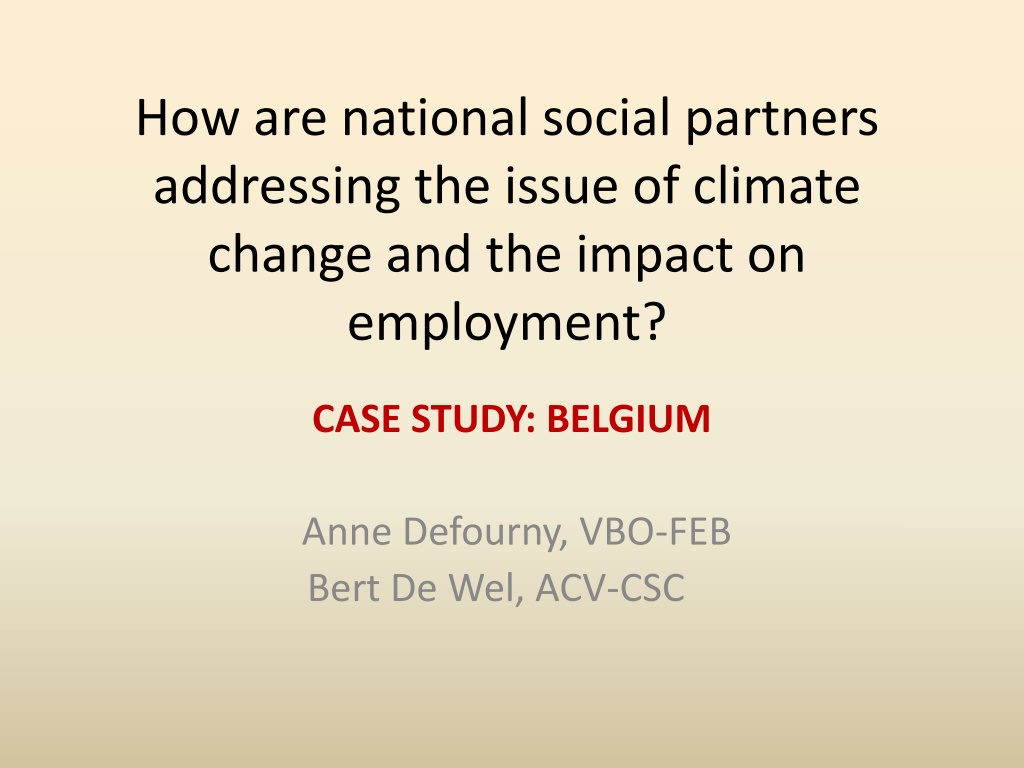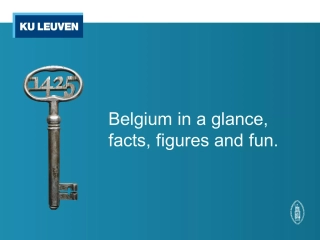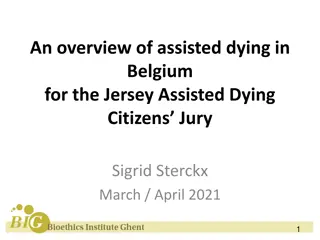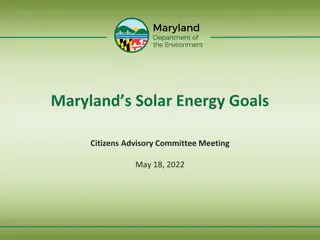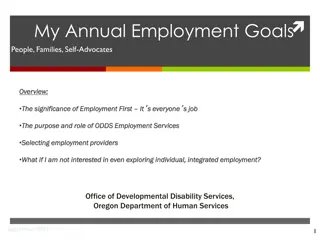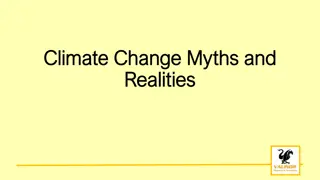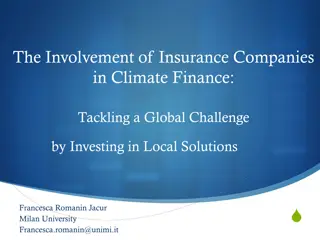Addressing Climate Change and Employment Impact in Belgium: A Case Study
National social partners in Belgium, including government bodies, trade unions, employers, and NGOs, collaborate on addressing climate change's impact on employment. Key initiatives include formal consultation processes, ecocheques, and specific climate-related actions. The stakeholders emphasize the need for a transition to a low-carbon economy, promoting innovation, education, and skills development for a sustainable workforce. Their joint efforts aim at balancing economic growth, job creation, and environmental protection.
Download Presentation

Please find below an Image/Link to download the presentation.
The content on the website is provided AS IS for your information and personal use only. It may not be sold, licensed, or shared on other websites without obtaining consent from the author. Download presentation by click this link. If you encounter any issues during the download, it is possible that the publisher has removed the file from their server.
E N D
Presentation Transcript
How are national social partners addressing the issue of climate change and the impact on employment? CASE STUDY: BELGIUM Anne Defourny, VBO-FEB Bert De Wel, ACV-CSC
Overview 1. Formal government consultation processes: a) Central Business Council and National Labour Council on Green Jobs b) Federal Council for Sustainable Development on the Climate Conference in Copenhagen c) and on the CO2 Price Signal 2. Ecocheques, a measure developed unilaterally among social partners 3. Some specific climate related initiatives of the social partners
Federal Council for Sustainable Development FRDO-CFDD trade unions & employers federations & consumers & NGO s Nov 2009 Joint statement: March 2010 Joint statement: on the climate conference in Copenhagen on CO2price signal 2008 2009 2010 oct dec jan.. march ... may...july sept nov...jan march may July 2009 : 1stjoint statement on Green jobs: -State of affairs -Topics to be discussed Oct 2008 Request for joint statement on Green Jobs: Minister for Employment and Equal Opportunity March 2010: 2ndjoint statement on Green jobs: - Consensual views over the topics Central Business Council and National Labour Council CRB-CCE/NAR-CNT trade unions & employers federations
1a. Central Business Council and National Labour Council Consensus opinion on green jobs: Concept difficult to define (narrow and broad definition) Lack of data for Belgium : SWOT analysis needed Transition to a low carbon economy Ambitious challenge and profound modification of the economy (like information society) Risks must be neutralized Opportunities for economic growth and jobs must be seized Shared responsability Public authorities : right framework conditions Social partners: competitiveness of our companies and fair transition 4
Important role of the promotion of innovation, R&D, entrepreneuship, partnerships, standards, tools aiming to change behaviours Education and training New skills and new qualifications will be needed Improvement of the match between demand and supply on the labour market Anticipation of skills need to be developped 5
1b. Federal Council for Sustainable development Consensus opinion on the Copenhagen climate summit Climate negotiations objective. Competitiveness of our companies. A fair transition enabling workers to have a decent job and income. Principle that if the reduction of emissions within Belgium is less costly than the reduction through flexibility mechanisms, domestic measures should be taken.
1c. Federal Council for Sustainable Development: Consensus opinion on the CO2 Price Signal (CO2 tax) Need for an appropriate policy mix to achieve the objective pursued. Strengthen the competitiveness of the Belgian economy which ensures employment and added value. Encourage research and innovation. Contribute to a fair transition by strengthening social cohesion. Should fit in an environmental program, rather than within a budget program.
2. National Labour Council: Ecocheques A unilaterally measure of social partners. Collective Industrial Agreements nr. 98, part of the Inter-professional agreement 2009- 2010. Tax-free bonus of 250 euro (2010) for employees to buy certain environmental goods and services (energy saving products, ecolabel products, ). The direct employment impact is probably very limited.
3. Specific climate related initiatives of the social partners 9
FEB: Promotion of Belgian eco-business abroad Belgian eco-business makes a significant contribution to global environmental and climate challenges, and offers solutions that anticipate the expectations of local governments, residents and business 10
FEB: Forum on energy efficiency McKinsey report: Energy efficiency saving potential of 29% making Belgium one of the most efficient future economy in terms of energy www.energyefficiency.be 11
Trade Unions RISE and BRISE a joint network of trade unions on environment information for trade union representatives in the Walloon and Brussels region. => www.rise.be There is a similar project in Flanders. Arbeid en Milieu joint organisation of trade unions with an environmental organisation => www.a-m.be Climate Coalition: mobilisation network of environment and social organisations (Greenpeace, WWF, trade unions, etc.).
More information: Anne Defourny VBO-FEB ad@vbo-feb.be Bert De Wel ACV-CSC BDeWel@acv-csc.be
